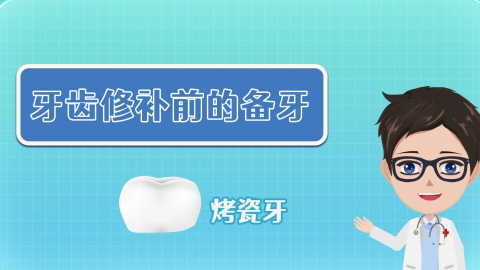What should I do if the porcelain on my porcelain-fused-to-metal crown chips or flakes off?
In general, chipping of porcelain-fused-to-metal (PFM) crowns may be caused by factors such as improper chewing habits, poor oral hygiene, inadequate tooth preparation, malocclusion, or periodontal disease. The solution must be selected according to the specific cause to achieve effective treatment. Prompt medical consultation is necessary, and treatment should follow medical advice. Details are as follows:

1. Improper chewing habits: Long-term use of PFM crowns to bite excessively hard foods, such as nuts or bones, or habitual use of teeth to open bottle caps, may subject the crown to excessive pressure, causing damage to the porcelain surface. Improve chewing habits and avoid biting excessively hard foods with the PFM crown.
2. Poor oral hygiene: Poor oral hygiene may lead to bacterial growth around the PFM crown, forming dental plaque and tartar. These bacteria and their metabolic byproducts may corrode the crown, reducing its strength and increasing the risk of chipping. Maintain good oral hygiene by brushing regularly, using dental floss and mouthwash.
3. Inadequate tooth preparation: Prior to PFM crown restoration, tooth preparation (removal of part of the tooth structure) is required to accommodate the crown. If the tooth preparation is inadequate, such as uneven or insufficient grinding, the crown may not have sufficient thickness, increasing the risk of chipping. Re-preparation of the tooth is necessary to ensure adequate thickness and strength of the crown. If chipping has already occurred, the crown should be removed and remade.
4. Malocclusion: Malocclusion may cause stress concentration on the PFM crown during mastication, making the porcelain surface more susceptible to damage. This may occur if high spots on the occlusal surface remain after cementation without adjustment. Adjust the occlusion of the PFM crown to eliminate high spots and ensure even force distribution. If chipping has occurred, repair or replacement of the crown is required.
5. Periodontal disease: Periodontal disease is an inflammatory condition affecting the supporting tissues of the teeth. If left untreated, it may lead to tooth mobility and gum recession, affecting the stability and strength of the PFM crown. Under the influence of periodontal disease, the crown may be more prone to chipping from external forces. Anti-inflammatory and analgesic medications such as metronidazole tablets, ibuprofen sustained-release capsules, and celecoxib capsules may be used as directed by a physician.
After restoration, maintain good oral hygiene, avoid biting hard objects that may damage the PFM crown, and schedule regular check-ups and maintenance.




